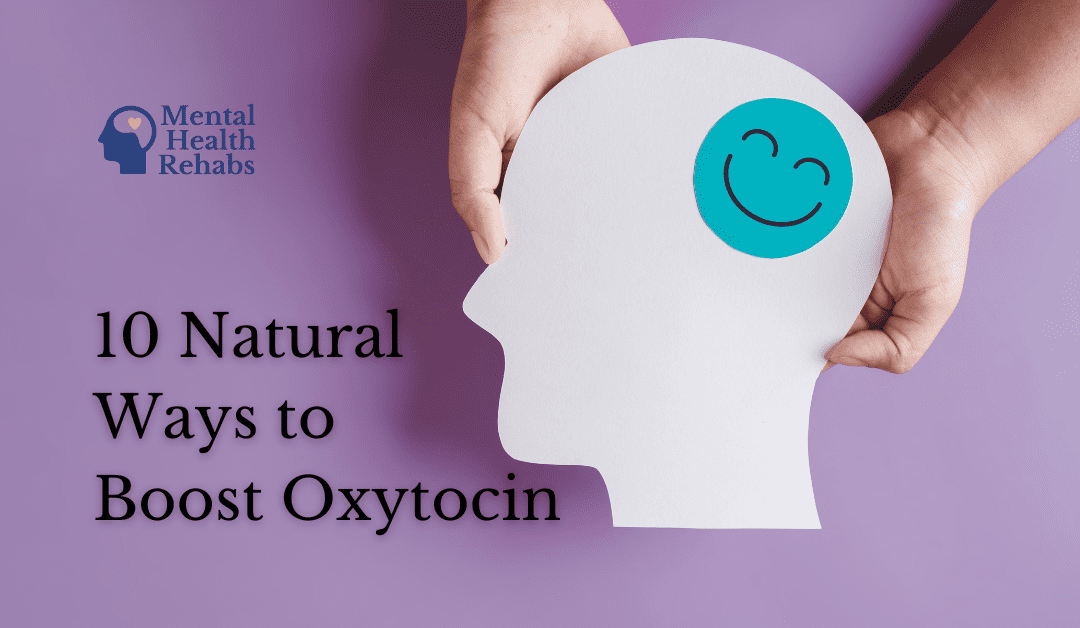In the journey toward mental well-being, the power of natural remedies often remains untapped. Oxytocin, recognized as the “love hormone,” greatly enhances emotional connections and overall mental health. This hormone, produced naturally by our brains, is key in building trust, fostering relationships, and promoting feelings of calm. Understanding natural ways to boost oxytocin can be a game-changer for everyone. Here are some ideas to naturally boost oxytocin.
1. Physical Touch
Studies have shown that physical contact like hugging and cuddling increases oxytocin levels, promoting feelings of calm and connectedness. It turns out that skin-to-skin contact activates pressure receptors under the skin, which then stimulate oxytocin release. This can reduce stress, lower blood pressure, and improve mood.
2. Social Bonding
Social interactions, particularly with trusted individuals, stimulate oxytocin release. Social activities activate brain regions associated with reward and empathy, triggering oxytocin production. Over time, this enhances trust, empathy, and bonding within social groups.
3. Pet Interactions
Interactions with pets, especially dogs, can increase oxytocin levels in humans. The mutual gaze between humans and dogs stimulates oxytocin, similar to that between mother and child. Spending time with pets increases feelings of relaxation and bonding and reduces stress.
4. Listening to Music
Music, mainly when it is emotionally significant, can elevate oxytocin levels. Music can evoke emotional responses, stimulating brain areas linked to oxytocin release. Listening to music can enhance emotional well-being and social connectivity.
5. Exercise
Regular physical exercise, especially in groups, can boost oxytocin. Exercise increases overall neurotransmitter activity, including oxytocin. Regular exercise can improve mood, reduce stress, and increase social bonding when done in groups.
6. Yoga and Meditation
These practices have been linked to increased oxytocin levels. They reduce stress and activate parasympathetic nervous system responses, which can stimulate oxytocin release. Holistic therapies like yoga and meditation can help enhance feelings of calm, connectedness, and mental clarity.
7. Acts of Kindness
Altruistic behavior has been associated with increased oxytocin. Acts of kindness and compassion activate brain regions linked to social bonding and oxytocin release. Volunteering fosters feelings of social connectedness and well-being.
8. Laughter
Laughter, especially in social settings, can increase oxytocin levels. Laughter triggers a cascade of brain activities associated with pleasure and social interaction, stimulating oxytocin release.
9. Parenting Activities
Activities like breastfeeding, cuddling, and playing with children boost oxytocin in parents. Parent-child interactions, especially physical contact and eye contact, stimulate oxytocin production. Parenting time can strengthen parental bonding and reduce overall stress.
10. Mindful Breathing
Deep, mindful breathing techniques can promote relaxation and increase oxytocin. These techniques activate the parasympathetic nervous system, which can trigger oxytocin release. Breathing practices help reduce stress and enhance feelings of calm and connectedness.
Benefits of Boosting Oxytocin Levels
Boosting oxytocin levels offers a range of benefits that extend beyond emotional bonding and stress reduction. Here are some of the key benefits:
- Enhanced Social Skills: Oxytocin can improve social cognition, helping individuals better recognize and interpret social cues. This can lead to improved understanding and navigation of social situations.
- Reduced Anxiety and Stress: Oxytocin has a calming effect on the brain and can counteract the stress hormone cortisol, reducing anxiety levels and a feeling of calmness.
- Pain Relief: Oxytocin has been shown to reduce pain perception, particularly in conditions like headaches, cramps, and overall bodily pain, due to its analgesic properties.
- Enhanced Parent-Child Bonding: In new parents, especially mothers, oxytocin is crucial in strengthening the bond with their newborn, which is vital for the child’s emotional and social development.
- Improved Heart Health: Oxytocin can potentially lower blood pressure and improve heart health. It has a cardioprotective role by reducing the stress-induced responses in the cardiovascular system.
- Boosted Immune System: Evidence suggests that oxytocin has immune-boosting properties, which can help fight infections and maintain overall health.
- Mood Regulation: Oxytocin can contribute to the regulation of mood, helping to reduce symptoms of mood disorders and contributing to a sense of overall well-being.
- Promotes Healthy Sleep Patterns: Oxytocin can influence sleep patterns, improving sleep quality. It has a soothing effect that can help in falling asleep more easily.
- Aids in Digestion: Some evidence suggests that oxytocin can improve gut motility and overall digestive health.
- Facilitates Learning and Memory: Oxytocin may positively impact learning and memory, particularly in social contexts, enhancing the ability to remember social information.
Wrapping Up
Oxytocin is integral to our emotional and physical well-being. We can naturally boost our oxytocin levels by engaging in activities like meaningful social interactions, physical touch, exercise, and acts of kindness. This strengthens our social bonds, improves our mental health, and offers many physical health benefits, including reduced stress, enhanced heart health, and better pain management.
Embracing these natural methods can lead us toward a more connected, healthier, and fulfilling life. In the dynamic field of mental health rehabilitation, incorporating strategies to increase oxytocin naturally can be a valuable adjunct to traditional therapies, offering a holistic approach to healing and well-being.

